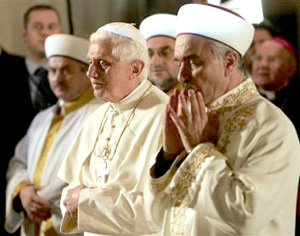The city of Rome has
long been a crossroads
of cultural and
religious dialogue,
frequently under the
patronage of the Holy
See over the last two
millennia.
It is the only city in
the world that welcomes
two ambassadors from
each foreign country,
one accredited to the
Italian state and the
other to Vatican City
State, or more
accurately, to the Holy
See. The ambassadors to
the Holy See possess a
unique mandate --
to
discover and develop
areas of common ground
and collaboration not
concerning commerce and
trade, but rather in the
realm of ethics,
service, and culture.
In the context of Egypt,
she said the challenge
is how to make the
secular model of
government survive a
possible takeover by
"rampant religious
hegemony." The goal,
then, is
to
promote a secular model
that functions as a
common platform where
the collective aim is
the public interest.
Religion should neither
be considered the "sole
reservoir of morality"
nor a "direct source of
legislation," but rather
a source for, and
contribution to,
legislation, as it
always has been in all
legal systems.
Ambassador Mekhemar said
a
new model of secularism
should accommodate the
aspirations of religious
groups while, at the
same time, rigorously
protecting basic
freedoms, human rights,
and the legal system.
In the United States,
secularism has not
resulted in a decrease
of faith, the ambassador
noted, nor has it
resulted in lessening
the contribution of
faith to the social
order.
Faith should bring a
diverse people together
in service, whether it
be fighting malaria in
Africa or earthquake
relief in Haiti.
Religious radicalism,
however, hinders this
interfaith cooperation.
Ambassador Kenan Gursoy
of Turkey, a professor
of philosophy, dwelt
upon the need to be
aware of one's own
identity and beliefs and
that
to
understand one's
religious identity is
only possible in a
situation of coexistence
with others of different
faiths. To live with the
other, we must
understand what is
essential and what is
transitory, and
recognize that universal
ethical values do
exist.
We
are on the threshold of
a new era, he said:
Ideas or approaches that
worked before no longer
work today because
society has changed due
to globalization, and
this has exposed a lack
of solidarity. What has
changed for the better
is a recent discovery of
fraternity from a
recognition of the
common elements in
monotheistic traditions,
which are the
transcendence of God and
the individual's private
relationship with God.
Peace between peoples,
the cardinal concluded,
is never achieved
through violent means,
but always
through dialogue and
mutual contribution.







